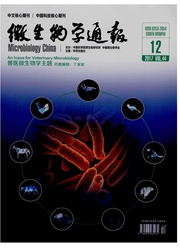

 中文摘要:
中文摘要:
【目的】优化蜡样芽胞杆菌R75E菌株产胶原酶的条件,并通过蛋白分离纯化技术获得高纯度胶原酶。【方法】利用单因素及正交试验优化蜡样芽胞杆菌R75E产胶原酶的发酵条件及发酵培养基,将发酵液离心除菌后得到粗酶液,对其依次通过硫酸铵分级沉淀、Butyl FF疏水层析及SuperdexTM 200凝胶过滤层析等方法对目标胶原酶进行分离纯化,利用SDS-PAGE电泳检测其纯度。【结果】优化后发酵条件为培养温度41℃、接种量6%、培养时间36 h,优化后发酵培养基为葡萄糖10 g/L、蛋白胨5 g/L、起始p H 7.0,粗酶液酶活力较优化前提高了2.9倍;将该粗酶液经过一系列纯化后得到纯度超过90%的胶原酶产物,其纯化倍数和回收率分别为18.4和1.1%。【结论】获得蜡样芽胞杆菌R75E的最佳产酶条件,并对胶原酶分离纯化的方法进行了探索,为微生物胶原酶的开发应用奠定基础。
 英文摘要:
英文摘要:
[Objective] This paper aimed to investigate the optimal fermentation of collagenase-producing conditions from Bacillus cereus R75 E and obtain the high purity collagenase by protein separation and purification techniques. [Methods] We optimized the fermentation conditions and fermentation mediums for maximum production of collagenase from Bacillus cereus R75 E using single factor experiment and orthogonal test. The collagenase-containing crude enzyme was obtained after centrifuging from the overnight fermentation of Bacillus cereus R75 E. Then, the target collagenase was sequentially purified by ammonium sulfate precipitation, Butyl FF hydrophobic chromatography and SuperdexTM 200 gel filtration chromatography. Its purity was detected by SDS-PAGE electrophoresis. [Results] The optimal fermentation conditions and mediums for maximum production of collagenase from Bacillus cereus R75 E were as follows: the fermentation temperature was 41 ℃, the inoculation volume was 6%, the fermentation time was 36 h, the carbon source was 10 g/L glucose, the nitrogen source was 5 g/L peptone, and the initial p H was 7.0. The total crude enzyme activity was increased by 2.9 times compared with that of the non-optimized control. Finally, the target collagenase was purified with a purity of more than 90%. The purification fold and recovery of the target collagenase were reached to 18.4 and 1.1%, respectively. [Conclusion] We get the optimum collagenase producing conditions from Bacillus cereus R75 E and construct a technological process for collagenase purification, which lay a foundation for the development and application of microbial collagenase.
 同期刊论文项目
同期刊论文项目
 同项目期刊论文
同项目期刊论文
 期刊信息
期刊信息
